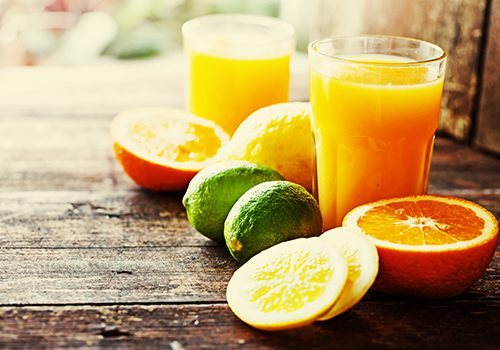[vc_row][vc_column width=”2/3″][vc_text_separator title=”Croí Nutrition & Dietetic Team”][vc_column_text]Like many of us, do you eagerly put cartons of juice in your shopping trolley in an effort to help your family achieve their Five-a-Day quota? Buyer beware – while fruit juice is tasty and refreshing, it is not a healthier alternative to whole fruit. So while we’re all keen to increase our daily fruit intake we should be careful not to load up on fruit juice.
The biggest problem with fruit juice is the high sugar content, lack of fibre and the quantity at which it is consumed. The main difference between whole fruit and fruit juice is the fibre content, when fruit is pressed or squeezed to make juice some nutrients and most notably fibre is lost. A small glass (100mls) of unsweetened fruit juice can provide one portion of your recommended Five-a-Day. However, if you drink more than a small glass it will still only account for one portion of your Five-a-Day!
The role of fibre
Fibre present in whole fruit has many health benefits, it promotes both heart and digestive health by helping to reduce blood cholesterol, control blood sugar levels and prevent constipation. It also keeps us feeling fuller for longer which has the added benefit for weight control. Whole fruit has moderate to high amounts of fibre, the fibre slows down the digestive process and provides a slow release of sugar in to the blood stream. Fruit juice has no fibre therefore the sugar is released in to the blood stream more rapidly and elevates blood sugar levels more quickly than whole fruit.
Be cautious of juice drinks
Many juice drinks available in supermarkets contain a small amount of real fruit juice and are often high in sugar. Therefore, it is easy to consume a large amount of calories with little nutritional benefit. Many people may consider fruit flavoured juice drinks to be a healthier alternative to fizzy soft drinks, however, a recent survey compared the sugar content of drinks regularly consumed by the public and showed that a 200ml serving of a popular juice drink contained as much sugar as the equivalent serving of well-known fizzy soft drinks. There is strong evidence to link the consumption of high sugar drinks with obesity.
Top Tips:
- For optimum nutrition choose whole fruit over fruit juice.
- If including fruit juice keep it to a small glass (100mls) of 100% fruit juice that contains no added sugar.
- Remember that a small glass (100mls) of fruit juice only contributes to one of your five-a-day regardless of how much you consume.
- If you are giving fruit juices to children, dilute it one part juice to ten parts water.
- All fruit juices are acidic and can damage teeth so are best kept to meal times.
- Water is the best alternative to high sugar drinks, including fruit juice.
[/vc_column_text][/vc_column][vc_column width=”1/3″][vc_single_image image=”7995″ img_size=”500×400″ alignment=”center” css_animation=”fadeInRight”][vc_single_image image=”7996″ img_size=”500×400″ alignment=”center” css_animation=”fadeInUp”][/vc_column][vc_column][/vc_column][/vc_row]
